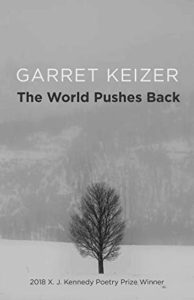The World Pushes Back, Garret Keizer 2019
Garret Keizer has been writing poetry for more than 30 years publishing in major magazines (The New Yorker, Ploughshares) and small, curated literary journals from the Alaska Quarterly Journal to the Atlanta Review, from the Hudson Review to the Southwest Review and nearly everywhere in between. He has finally gathered 59 of those poems, 18 of which have not been previously published into “The World Pushes Back”. Keizer is the paragon of the focused, hard-working, wide-ranging, and productive Renaissance man. While publishing at a pace of a poem a year in outstanding literary journals, he also managed to work as an Episcopal priest serving a small congregation in Island Pond, VT for 10 years and as a high school English teacher for more than a dozen years at Lake Region Union High School in Barton, VT. During that time he wrote and published eight books from a young adult novel to non-fiction books and essays on topics ranging from noise in our environment to privacy, from the concept of help to the enigma of anger. Throughout that work, he has brought to bear a strong sense of moral responsibility, community, and concern for his fellow human beings. Those ideals that he has expressed over the last 32 years of writing prose are clearly evident in this, his first poetry collection. “The World Pushes Back” is a great way to get engaged with poetry, this ancient and often beautiful literary form. Keizer addresses all the big themes—-nature, love, mortality, family, history—-intimately and with details that provide the reader with many “Aha moments”, when poetry provides us with a feeling, a memory, an understanding of ourselves and the world that may have been there but had gone unrecognized.
The first line of the first poem in this volume sets the tone: “The older I get the less I’m bothered/by seeming incongruity…..Eventually you find the rhyme/for every word. The night/is coming—-perhaps that’s why—-/the color that goes with everything.” Entire books about aging are being written for the Baby Boomers as we gently drift towards the end. Keizer sums it all up beautifully in a few lines!
Whether he’s writing about the horrors of WWI in 1917 and the inhumanity of man who converts the beauty of ‘simple machines’ into instruments of torture or about the quotidian details of his morning routine (“Everything is better in the morning,/the first pretzel/and the first written word,”), Keizer’s choice of words echoes for me the famous quote of Coleridge describing poetry as ‘the best words in the best order’.
I had difficulty in choosing my favorite poems among the 54 in this collection, but finally settled on three that for me conjure up the Vermont that I love. In ‘The Neighbors’ Keizer writes about people who build a house on the hill above his home, “thus ruining/forever the satisfaction I took/in seeing no house but mine/in any direction./I felt cheated and bitter.” Time passes, the neighbors become dear friends, and the poem’s final stanza summarizes the change: “So I live at the foot of the hill,/and any bitter man who would climb it,/meaning my neighbors harm,/must first get past me.”
In ‘Cooking in Reverse’, Keizer writes a love letter to compost, one of my favorite garden things. In words far beyond my ability to express my own feelings, he writes “With every heaping shovelful/the crooked coils of last season’s/cucumber and tomato vines compress/like bedsprings.” The poem ends with “Come spring I’ll dish it out/in lavish, loamy helpings,/another matter of reversals—-feeding/the garden that feeds me/its first and final meal.”
Finally In recognition of the oft experienced power failures in our rural setting, ‘Now and Then’ finds the beauty in the latest power outage. “The power’s been out since four a.m./when a thunderstorm ripped over our mountain./All morning long I’ve been aware/ of the silence in the house….I think that sounds were sharper/against that stillness,/bird songs and piano chords,/the voice that called your name.”
It’s difficult to capture the combination of quiet beauty in writing about the everyday in rural Vermont and the quiet outrage about man’s inhumanity to man in these poems that Keizer has written over 30+ years. Read them and then read them again. Each reading will reward you with new insights and awareness of the great art behind a simple poem.



